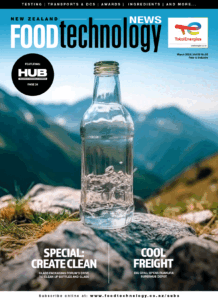How R&D funding supports facilities investment
 If you’re developing new products or processes for the future of food in New Zealand then Tom Moore, director at the business advisory firm BlueRock, says there’s opportunity for food and beverage businesses large and small to cut the cost of innovation by accessing R&D funding streams.
If you’re developing new products or processes for the future of food in New Zealand then Tom Moore, director at the business advisory firm BlueRock, says there’s opportunity for food and beverage businesses large and small to cut the cost of innovation by accessing R&D funding streams.According to Statistics New Zealand, Aotearoa’s food and beverage industry is seeing a surge in innovation investment, with businesses across the country increasing their research and development (R&D) spending by 17% last year.
This double-digit growth reflects a broader national trend, says Moore, as companies strive for a competitive advantage in the new realities of shifting consumer preferences and environmental challenges.
“With high costs of labour, energy, and capital, the drive for innovation is not just about staying competitive; it’s about unlocking new efficiencies across the supply chain. Now may be the perfect time for New Zealand businesses to strategically leverage this momentum, turning innovation into a catalyst for sustained growth and market leadership,” says Moore.
Yet for food and beverage businesses to develop new product formulations, enhance production processes, develop sustainable packaging solutions, or otherwise achieve an innovative edge, they need to pursue a significant programme of investment. Moore explains that many local food and beverage businesses have not yet appreciated how recent improvements in Government R&D funding make innovation investment much more attractive.
Packing potential: A funding success story
Moore told NZ FoodTechnology News how a BlueRock client used the NZ R&D Tax Incentive (RDTI) to fuel their innovation in facilities and achieve a competitive edge. “Our client operates a large and modern fruit packhouse facility, providing orchardists and growers with a suite of post-harvest services to test, manage, and fully prepare their fruit for shipping to key international export markets,” says Moore.
With an eye to the future, the company decided five years ago to invest in purpose-built facilities and a dedicated, multi-million-dollar programme of innovation and technical enhancement to their equipment and facilities.
“This required the development of new and unique automation solutions due to the specific nature of the fruit handled, the required packing configurations, and the local conditions. Specific designs were drawn up, world-first systems set up, and extensive tests carried out over hundreds of hours through the off-season.”
Costs offset by 15% RDIT refundable tax credit
The company’s entire system development costs were offset by a 15% refundable tax credit from the RDTI.
This approach helped fund:
• Specialist contractors and consultants
• Time of technical staff to develop and test new systems
• Packing materials and consumables used for testing
• Depreciation of equipment and machinery during the testing
• A contribution to utilities, rent, insurance, and other overheads.
“By strategically investing in innovation, the packhouse increased its efficiency and productivity, meaning it could achieve higher throughput over the time-limited season,” says Moore. These cost savings were passed on to their customers in the form of lower prices, helping the company achieve a clear competitive edge.
Finding a partner in innovation
The RDTI is a “powerful tool for New Zealand’s food and beverage industry”, fostering innovation and helping businesses overcome the financial hurdles of doing R&D. Yet Moore points out it is just one of several Government funds that are widely underutilised.
“Additional tax refunds for up to 28% of the R&D investment are an option for many businesses who may not even realise they qualify. And a recently improved grant now offers a 40% refund to businesses embarking on their first or most recent R&D investment. With careful consideration of each fund, some businesses are receiving combined benefits.”
For many small to medium sized businesses, Moore explains that engaging an independent consultant is the best approach to ensure they unlock the full potential of funding in New Zealand.
BlueRock, the Melbourne-based multidisciplinary and entrepreneurial advisory firm, launched in 2008 and has since helped 7,000 SMEs grow and navigate business challenges. Since Moore launched their New Zealand arm in in 2022, he says BlueRock has become a “trusted partner for many New Zealand businesses seeking advice and assistance to access Government grants and incentives”.
The company’s Christchurch-based consultants work with businesses across the food tech sector, including innovators in packaging, distilling, brewing, coffee roasting, nutritional supplements and more.
Moore believes the time is right for New Zealand food and beverage businesses to harness the power of funding to strategically invest in innovation.
Sponsored content: For more information phone +64 272 386 858, email [email protected] or visit www.thebluerock.co.nz.


































































































